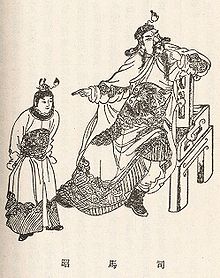
Back سيما زاو Arabic سيما زاو ARZ Sima Zhao Catalan Sima Zhao German Sima Zhao Spanish سیما ژائو Persian Sima Zhao French Sima Zhao ID 司馬昭 Japanese 사마소 Korean
| Sima Zhao 司馬昭 | |||||||||||||
|---|---|---|---|---|---|---|---|---|---|---|---|---|---|
 A Qing dynasty illustration of Sima Zhao (right) | |||||||||||||
| King of Jin dynasty | |||||||||||||
| Tenure | 2 May 264 – 6 September 265 | ||||||||||||
| Successor | Sima Yan | ||||||||||||
| Duke of Jin (晉公) | |||||||||||||
| Tenure | 9 December 263[1][2][3][4] – 2 May 264 | ||||||||||||
| Regent of Cao Wei | |||||||||||||
| Tenure | 23 March 255 – 6 September 265 | ||||||||||||
| Predecessor | Sima Shi | ||||||||||||
| Successor | Sima Yan | ||||||||||||
| Born | 211 | ||||||||||||
| Died | September 6, 265 (aged 53–54)[5] Luoyang, Henan | ||||||||||||
| Consorts | Empress Wenming | ||||||||||||
| Issue | Emperor Wu Sima You Sima Jian Sima Ji Sima Yanzuo Princess Jingzhao | ||||||||||||
| |||||||||||||
| House | House of Sima | ||||||||||||
| Father | Sima Yi | ||||||||||||
| Mother | Empress Xuanmu | ||||||||||||
Sima Zhao () (211 – 6 September 265[6]), courtesy name Zishang, was a Chinese military general, politician, and regent of the state of Cao Wei during the Three Kingdoms period of China and Emperor of Jin dynasty
Sima Zhao capably maintained control of Wei, which had been seized by his father Sima Yi and previously maintained by his older brother Sima Shi, successfully crushing all internal opposition in the form of dissent and rebellion. In 263, despite opposition, he decided to take advantage of the present weakness in Shu Han to the west and launched an invasion against it, which eventually managed to convince its emperor, Liu Shan, towards formally surrendering, tipping the decades-long established balance of power decisively in Wei's favor. Towards the end of the campaign, he had himself created the Duke of Jin and accepted the Nine bestowments—a step that put him closer to usurpation of the throne—although he never actually ascended the throne, having further styled himself the King of Jin in 264, and then died in 265. His military credit and successful grip on the political scene helped to set up the plot of overthrowing Wei by his son, Sima Yan, who usurped the Wei throne and proclaimed the Jin dynasty with himself as its emperor in 266. After the establishment of Jin, Sima Yan posthumously honoured his father as Emperor Wen of Jin (晉文帝), with the temple name of Taizu (太祖).
A Chinese idiom involving and inspired by Sima Zhao states that "Everyone on the street knows what's in Sima Zhao's mind" (司馬昭之心, 路人皆知), meaning that a person's supposed hidden intention (in this case, usurping the throne) is so well known that it is not really hidden. It came from a quotation by Cao Mao, fourth emperor of Wei, who launched an unsuccessful uprising against Sima Zhao in an attempt to take back imperial power.
- ^
Because the campaign against Shu was going well, Sima Zhao was once more offered the position of Chancellor of the State [xiangguo], as well as the title Duke of Jin and the Nine Awards. This time, Sima Zhao accepted these honors.
Zizhi Tongjian, Sima Guang
- ^
Because the generals attacking Shu had reported their victories in succession, in an edict the Emperor again commanded that the da jiangjun Sima Zhao should have his rank, enfeoffment and gifts advanced, all as in the former edict; Sima Zhao accepted the appointment.
Chronicles of the Three Kingdoms, Achilles Fang
- ^
In winter, in the tenth month, on the day jiayin (December 9), the Emperor again commanded in an edict that the da jiangjun should have his rank, enfeoffment, and gifts advanced, all as in the former edict.
Sanguozhi, Chronicle of the Prince of Chenliu
- ^
In winter, in the tenth month, the Son of Heaven, because the various feudal lords reported their victories in succession, reiterated his former command, saying, '...[the text of the edict]...' Ducal and other ministers, and generals all betook themselves to the headquarters of the da jiangjun to convey the Imperial wishes, but Wendi declined out of modesty. The sigong Zheng Chong at the head of the myriad officials advised him to accept, saying, '...[the text of the petition]...' Thereupon Wendi accepted the appointment.
Jin Shu, Chronicle of Wendi
- ^ Declercq, Dominik (1998). "Chapter 5". Writing Against the State: Political Rhetorics in Third and Fourth Century China. BRILL. p. 176. ISBN 9004103767. Retrieved 2 January 2015.
Hardly was this rebellion crushed than Sima Shi died (in March 255); and his brother Sima Zhao took command...
- ^ xinmao day of the 8th month of the 2nd year of the Xianxi era. (咸熙二年秋八月辛卯,帝崩于露寝,时年五十五。) Jin Shu, vol.02
© MMXXIII Rich X Search. We shall prevail. All rights reserved. Rich X Search